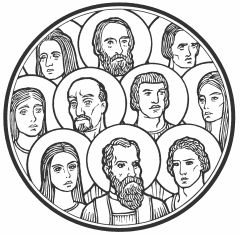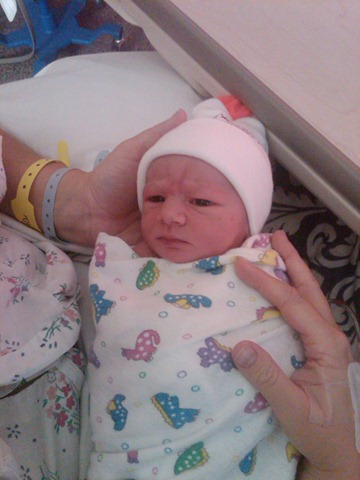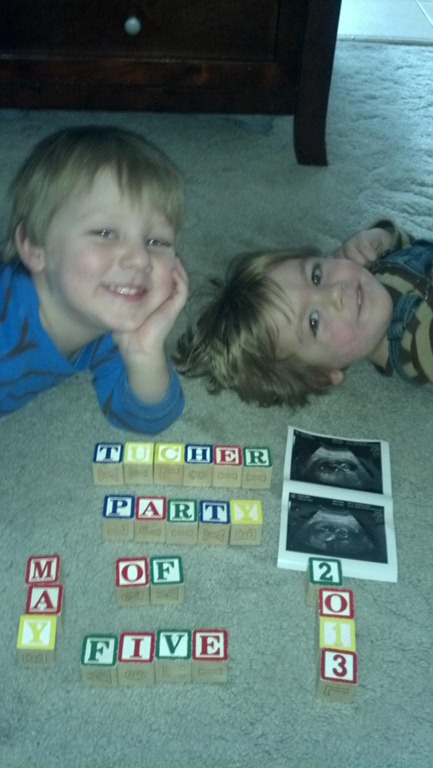Grace, mercy, and peace to you from God our Father, and from our Lord and Savior, Jesus Christ, amen. The text for the sermon is the Gospel, which was read earlier.
It’s the beginning of the end. Or is it the end of the beginning? Today’s Gospel reading comes up twice in the Church Year: the First Sunday of Advent, today, and Palm Sunday, the beginning of Holy Week, leading up to the death of Jesus. Though we see on Palm Sunday Christ’s entrance to Jerusalem marking His impending death, we see in our text for today the beginning of a new Church Year, and in its beginning, it points the Church toward Calvary.
For the Christian, we begin the season of Advent today. It is the period of expectant waiting and preparation for the celebration of the Nativity of Jesus, in other words, the period immediately before Christmas. If there is one word that best captures the meaning of the season of Advent, it is probably waiting. During Advent the church confesses the wisdom that Jeremiah spoke so long ago: “It is good to wait quietly for the salvation of the Lord.”
The Church this First Sunday in Advent directs her attention to the final chapter in the saga of salvation. And that is as it should be, for crib and cross go together. You cannot have one without the other. This astounding little bundle of joy was born to save, in other words, to die, and to lay down His life in payment for the sins of the entire world.
Likewise, there is no salvation apart from God in the flesh of Jesus. It was no heavenly principle or concept that died, but a real man, with real flesh and blood like ours. In order to remove the just penalty for our sin, He first took on a human body, born of a woman, born under the Law, to redeem those who were under the Law, so that we might receive adoption as sons. Crib and cross, cross and crib; like bookends, they enclose the whole story of God’s salvation in His incarnate Son.
On the scale of human events, this Palm Sunday ride doesn’t really seem so big. It was humble. Jesus rode on a donkey. He sat on a saddle of outer garments, actually, which served as coats, and cloaks, and blankets at night, and protection against sand storms, and as an all-around, multi-purpose garment. That is what the disciples threw on the backs of the donkey. Others lined the road with their cloaks, and still others cut branches off of the local palm trees and carpeted the path of Jesus with those. Some took the palm branches and waved them and called out “Hosanna.” It wasn’t as impressive as we might think, but there was more here than meets the eye.
In Advent, we look forward to the coming of the King, and we remember how He came. We look forward by looking back. It doesn’t matter that the crowd was small, or large. The crowd proclaimed the truth that Jesus Christ is the fulfillment of the promises of the prophets. Their testimony tells us that we are awaiting the coming of He who will fulfills the promise to us. We aren’t looking forward to His death, or the work of redemption. They were, but we do not look forward to that because we can see by looking back that He has already done it. Rather, we focus on the words of the people, “Behold, your king is coming to you.”
That is what Advent prepares us for, the coming of in the infant Jesus. During this season, we take the time to have a history lesson of our faith. We take a little time to refocus and reorient ourselves to God’s interaction with us—the coming of our Lord and Savior to us and for us for the sole purpose of living and dying for us and our sins. The nativity of our Lord certainly is an important part of this divine and compassionate interaction. The womb of Mary and the Bethlehem manger are the starting points for Jesus Christ’s long, purposeful march to Calvary for our salvation. But that’s just it. These are the starting points of our salvation history. These are not ending points for a different Bible story. All too often mankind’s salvation is treated as two separate historical narratives though. A baby named Jesus was born at Christmas time and that means joy and peace on earth. Coincidentally, we also celebrate a thirty-three year old man named Jesus who suffered, died, and was resurrected at Easter time, which means peace in heaven and forgiveness for all mankind. However, today, we look not at the cross as much as we do the crib.
Why was Jesus conceived by the Holy Spirit and born of the virgin Mary in a humble little stable in Bethlehem? Because of our sin; because of our complete inability to bring about our own salvation in any way, shape, or form! This is precisely what makes Advent a penitential season no different than Lent. This is precisely why the Palm Sunday account has been the traditional Gospel lesson for the first Sunday in Advent for centuries. This account serves to take us back to the real reason for the season. The manger only makes sense when understood through the lens of the cross.
In this season of Advent, we prepare ourselves for Christ’s coming. It is a time of repentance, a time of sadness over sin, for it is our sin that made it necessary for the Son of God to come into the world in the first place. But while it is a time of repentance, it is also a time of hope and joy. Since we are sinners, we have a Savior to redeem us. Just as we have seen the end of another Church Year, we mark the beginning of a new one, but it also marks the beginning of a new era for us all: an era that has Christ as its Head, and we as His redeemed children.
Advent is the spark of hope in the darkness of sin. It is the anticipation of rescue from the pit of despair. It is generation after generation of sacrifices that remind us of our sin and also point forward to the Savior from that sin. It is an emptiness waiting to be filled. The traditional Advent is a time of repentance that prepares us for Christmas in much the same way that Lent prepares us for Easter. It is a time for examining oneself and finding sin. It is a time to contemplate the idea that we desperately need God to come into this world and rescue us.
Therefore, in this season of Advent, let us prepare our hearts once more for our Lord’s coming. We can enjoy the many traditions in this world that have sprung up around Christmas, but let us also hold fast to the eternal meaning of Advent. We are sinners and we need a Savior. God the Son came to take on human flesh in order to be that Savior. He still comes in order to offer His salvation. On the Last Day His coming will raise all the dead and all who believe in Him will live with Him forever in a new world of eternal joy and peace. During this Advent let us remember how He came, how He will come, and how He now comes. In Jesus’ name, amen. Now the peace of God that passes all understanding, keep your hearts and minds through faith in Christ Jesus, amen.


